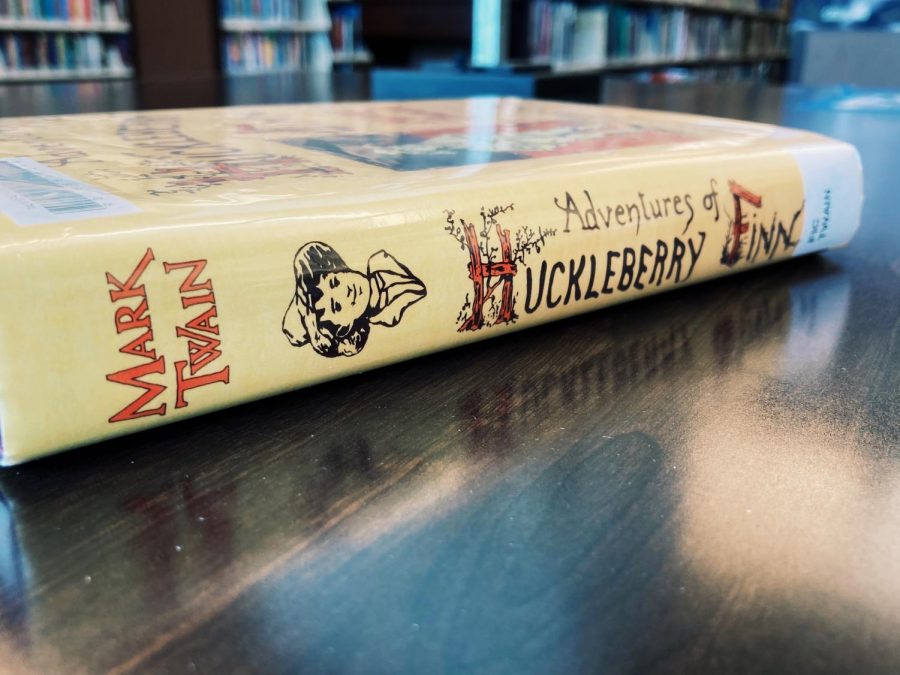The Dilemma of Huckleberry Finn
“The Adventures of Huckleberry Finn” is a classic novel that has been controversial since its release.
July 16, 2020
It is a normal day in English Class. A student picks up their book and is called to read aloud. As the student is reading, an inappropriate word appears on the page.“N-”, the student begins to say, but stops when their eyes glance upon the remaining letters. On one hand, the student may feel that the word is simply there for literary purposes and there is no issue with vocalizing it. Alternatively, the student could also choose to skip the word and continue reading.
Situations like this frequently occur in the classroom. As a result, there have been debates on whether or not certain words should be censored in literary texts, namely the N-word. Furthermore, there has been an argument on whether or not these texts should even be taught in the classroom.
One book that has been central to this conflict is The Adventures of Huckleberry Finn. Written by Mark Twain, this classic novel follows a young boy named Huckleberry Finn. Finn has a deep desire to escape a civilized lifestyle. He is a free spirited, reckless, but still lovable character who naturally goes against what is expected of him. In the text, Huckleberry Finn runs away and meets Jim, a runaway slave. The N-word is shown 200 times in the novel. Societal reactions to this term in nineteenth century America are different from those in the twenty-first century. During the period this novel was written in, many did not see this term as being offensive unless they were black. As a matter of fact, it would not be surprising to hear this word in normal conversation. However, as times have developed, the derogatory connotation of the term has been brought to light.
The Adventures of Huckleberry Finn was written as a satire of American society. Twain was not a supporter of the status quo that was developing in the states . The loss of individuality and the routine lifestyle brought about by the education system was disappointing for a creative writer like himself. Through his work, he was able to voice his feelings through his characters. However, not everyone took this well and his book was first banned by librarians in Massachusetts in 1885.
Since 1885, the book has been banned on numerous occasions. Recently, there were attempts to ban the novel from being taught in classrooms in New Jersey. As opposed to the earliest complaints surrounding the book in the 19th and 20th century, recent critics have attacked it for its racially charged language.

Many argue that the book may inspire acts of racism. Deleting the N-word from everyday speech has been a constant battle. To this day, this term is used against African Americans. Those who exhibit racist behavior often use this word when talking about African Americans. It expresses a belief that African Americans are inferior and unworthy, which is appalling. Despite this, some people still do not understand that it is not their place to say this word. Critics of Huckleberry Finn believe that the exaggerated use of the N-word in Twain’s novel will influence more people to say it. In 2011, a censored edition of Huckleberry Finn was published, in which the N-word was replaced with slave.
“I don’t see color”- a claim that has been used at nausea by people who try to persuade others they are not racist. Modern day racism is a result of ignorant people who still believe in stereotypes and choose to not educate themselves. Erasing history will not solve racism. My response to the quote above is no, please see color. Please take the time to see how African Americans have been constantly looked down upon throughout the history of this nation. Please see that this phrase you think is okay to say because you “have black friends” actually leaves deeper scars than you think. If one word is enough to make someone racist, there is a much bigger issue going on. If reading the N-word in a book is enough to make someone believe that a group of people deserve to be harassed, there needs to be a re-evaluation of the heart, not the book.
Now, let’s return to that awkward scenario. As the teacher watches the student struggle in this moment, he or she can take one of two routes- either act like the word was never there and continue reading, or use this as a teachable moment. The classroom is filled with students from all backgrounds. There may be kids in there who have been taught to treat those of a darker complexion with little respect their whole lives. School is the first institution we go to where we realize that there is a whole other world out there that is different from the one we know. It is the first place we go where we learn the stories, beliefs, and ideas of others. A valuable lesson on the impact of slavery and basic human rights can be taught from Huckleberry Finn. Instead of looking for metaphors, similes, and personification , teachers and students should search for how themes in this book can be applied to societal problems today. Although fictional, The Adventures of Huckleberry Finn provides a teachable account of race relations in the late 1800’s.
Yes, it is completely understandable why people want to remove The Adventures of Huckleberry Finn from the curriculum. Frankly, the novel does have the ability to expose students to the N-word and racial relations at a young age. However, this does not have to be a bad thing. Acting like the problem doesn’t exist will not fix it. We study history to learn its lessons, and frankly, those actions we believe to be historic are still continuing. We must look the issue in the eye and learn from it. Only then, can recovery ever occur.
